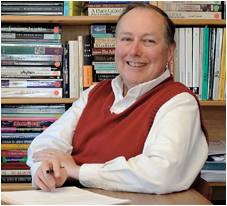
 Charles L. Glenn is professor of educational leadership, teaching courses in education history and US and comparative policy.* With Jan De Groof he is just finishing up the new edition, in four volumes, of Balancing Freedom, Autonomy, and Accountability in Education, with chapters on sixty countries by experts from those countries.
Charles L. Glenn is professor of educational leadership, teaching courses in education history and US and comparative policy.* With Jan De Groof he is just finishing up the new edition, in four volumes, of Balancing Freedom, Autonomy, and Accountability in Education, with chapters on sixty countries by experts from those countries.
The first volume will consist of essays by a number of authors, each looking at one theme across the many nations. Today I finished my contribution, on government-prescribed values in curriculum, and thought I would share a somewhat surprising finding: they seem to make very little difference!
Jan De Groof and I are just finishing up the new edition, in four volumes, of Balancing Freedom, Autonomy, and Accountability in Education, with chapters on sixty countries by experts from those countries. The first volume will consist of essays by a number of authors, each looking at one theme across the many nations. Today I finished my contribution, on government-prescribed values in curriculum, and thought I would share a somewhat surprising finding: they seem to make very little difference!
It is very common, I found, for governments to prescribe in detail how schools should promote citizenship and human rights. It is also common (though not universal) for governments to make provision for religious education in public schools, usually with an opt-out provision and sometimes with a choice between different religious traditions. When I compared these requirements with the results of the International Civic and Citizenship Education Study of 38 countries, however, I found little indication that they had an effect on the attitudes of the adolescents surveyed.
To get specific, in the Czech Republic, “at secondary school considerable attention may be given to topics such as citizenship, European citizenship, globalization, environmentalism and multiculturalism.” Malta has unusually extensive curriculum requirements, insisting that “schools should serve as a testing ground for democracy in keeping with the declarations and treaties signed by Malta in the past, and with the constitutional obligations of the country. As key institutions within civil society, schools should foster among their students respect for others, and for the right of other people to enjoy freedom, peace, security and the benefits of a society governed by law and order. In a society that is increasingly becoming multi-cultural, the educational system should enable students to develop a sense of respect, co-operation, and solidarity among cultures.” Schools in Latvia are expected to foster “the development of a responsible, tolerant and democratic citizen of the state and Europe, as well as instilling the opinion that human life is the highest value.”
But countries that articulate such standards are not necessarily those in which human rights are most consistently respected; the ICCS survey found that eighth graders in the Czech Republic, Latvia, and Malta were considerably less likely than the average of other countries to express support for equal rights for ethnic and racial groups.
The same disconnect is evident when we look at countries like England that mandate religious education in public schools and yet have far lower rates of religious belief and practice than do the United States, which forbid it.
In short, the prescription, by government, of value-laden curriculum objectives does not seem effective, and indeed I argue in my essay that government control or intrusive oversight can work against its intended purpose, by cultivating a passivity on the part of teachers and students alike that is anything but a model of engaged citizenship.
Let me explain that a little. One of the conclusions of the ICCS survey was that “civic knowledge is a negative predictor of expected active political participation”; that is, students who know more about how government works and so forth are actually less interested in being politically active as adults. Adolescents in Indonesia, by contrast, score low on civic knowledge but high on confidence in themselves and in the political process. The authors concluded that commitment to active citizenship depends more on the pedagogy employed and the school climate than on the officially-prescribed content. Schools in which students had a sense of belonging made them more interested in citizenship.
This is consistent with the many studies, in Western Europe as well as North America, of faith-based schools with a strong shared ethos. As with citizenship education, it may be that religious education as a subject is less effective than many hope (or fear). At the same time, there is ample evidence that schools with a religious character may have a profoundly positive effect on academic and character growth as well as on faith development. Once again, it is well to focus on what a school does, rather than on a prescribed curriculum.
The author of the profile of the Czech Republic, arguably the most secularized country in the world (only 25 percent of eighth graders claimed a religious identity, and eight percent had attended a religious service within the past month), is interesting in this regard: “In many cases, alternative and church schools have thus become a solution for families who do not believe that the common school can fulfill social and supreme human values in a world full of risk factors such as violence and intolerance.”
I concluded my essay by suggesting that the reader interested in the topic of education in character, values, and worldview might well find more of interest in the section of each country profile concerned with the distinctiveness of schools than in the section on government prescription of teaching about values. It is schools with a clear and distinctive mission, often–though by no means always–with a religious character, and teachers who are not following a government-prescribed script, that seem most likely to produce graduates prepared to engage confidently with the world.
* From 1970 to 1991 Charles L. Glenn was director of urban education and equity efforts for the Massachusetts Department of Education, including administration of over $200 million in state funds for magnet schools and desegregation, and initial responsibility for the nation’s first state bilingual education mandate and the law forbidding race and sex discrimination in education. His research in Europe and North America focuses on urban schooling, parental choice, schooling of linguistic and racial minority pupils, religion and education, history and sociology of education, reconciling national standards with school autonomy and distinctiveness, school desegregation and equity.Partager sur :
Facebook
Twitter
Pinterest
WhatsApp

